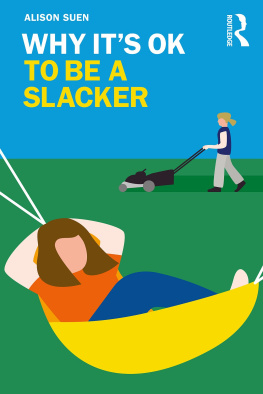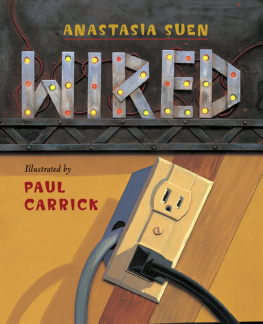Why Its OK
to Be a Slacker
Stop slacking off!
Your parents may have said this to you when you were deep into a video-gaming marathon. Or maybe your roommate said it to you when you were lounging on the couch scrolling through Instagram. You may have even said it to yourself on days you did nothing. But what is so bad about slacking? Could it be that theres nothing bad about not making yourself useful?
Against our hyper-productivity culture, Alison Suen critically interrogates our disapproval of slackersindividuals who do the bare minimum just to get by. She offers a taxonomy of slackers, analyzes common objections to slacking, and argues that each of these objections either fails or carries problematic assumptions. But while this book defends slacking, it does not promote the slacker lifestyle as the key to something better (such as cultural advancement and self-actualization), as some pro-leisure scholars have argued. In fact, Suen argues that slacking is unique precisely because it serves no noble cause. Slacking is neither a deliberate protest to social ills nor is it a path to autonomy. Slackers just slack. By examining the culture of hyper-productivity, Suen argues that it is in fact OK to be a slacker.
Alison Suen is Associate Professor of Philosophy at Iona College, New York. She is the author of The Speaking Animal: Ethics, Language and the Human-Animal Divide (2015) and the volume editor of Response Ethics (2018).
Why Its OK : The Ethics and Aesthetics of How We Live
ABOUT THE SERIES:
Philosophers often build cogent arguments for unpopular positions. Recent examples include cases against marriage and pregnancy, for treating animals as our equals, and dismissing some popular art as aesthetically inferior. What philosophers have done less often is to offer compelling arguments for widespread and established human behavior, like getting married, having children, eating animals, and going to the movies. But if one role for philosophy is to help us reflect on our lives and build sound justifications for our beliefs and actions, it seems odd that philosophers would neglect arguments for the lifestyles most peopleincluding many philosophersactually lead. Unfortunately, philosophers inattention to normalcy has meant that the ways of life that define our modern societies have gone largely without defense, even as whole literatures have emerged to condemn them.
Why Its OK: The Ethics and Aesthetics of How We Live seeks to remedy that. Its a series of books that provides accessible, sound, and often new and creative arguments for widespread ethical and aesthetic values. Made up of short volumes that assume no previous knowledge of philosophy from the reader, the series recognizes that philosophy is just as important for understanding what we already believe as it is for criticizing the status quo. The series isnt meant to make us complacent about what we value; rather, it helps and challenges us to think more deeply about the values that give our daily lives meaning.
Titles in Series:
Why Its OK to Want to Be Rich
Jason Brennan
Why Its OK to Be of Two Minds
Jennifer Church
Why Its OK to Ignore Politics
Christopher Freiman
Why Its OK to Make Bad Choices
William Glod
Why Its OK to Enjoy the Work of Immoral Artists
Mary Beth Willard
Why Its OK to Speak Your Mind
Hrishikesh Joshi
Why Its OK to Be a Slacker
Alison Suen
Selected Forthcoming Titles:
Why Its OK to Get Married
Christie J. Hartley
Why Its OK to Love Bad Movies
Matthew Strohl
Why Its OK to Eat Meat
Dan C. Shahar
Why Its OK to Mind Your Own Business
Justin Tosi and Brandon Warmke
Why Its OK to Be Fat
Rekha Nath
For further information about this series, please visit: www.routledge.com/Why-Its-OK/book-series/WIOK
ALISON SUEN
Why Its OK
to Be a Slacker
First published 2021
by Routledge
52 Vanderbilt Avenue, New York, NY 10017
and by Routledge
2 Park Square, Milton Park, Abingdon, Oxon, OX14 4RN
Routledge is an imprint of the Taylor & Francis Group, an informa business
2021 Taylor & Francis
The right of Alison Suen to be identified as author of this work has been asserted by her in accordance with sections 77 and 78 of the Copyright, Designs and Patents Act 1988.
All rights reserved. No part of this book may be reprinted or reproduced or utilised in any form or by any electronic, mechanical, or other means, now known or hereafter invented, including photocopying and recording, or in any information storage or retrieval system, without permission in writing from the publishers.
Trademark notice : Product or corporate names may be trademarks or registered trademarks, and are used only for identification and explanation without intent to infringe.
Library of Congress Cataloging-in-Publication Data
A catalog record for this title has been requested
ISBN: 978-0-367-72365-1 (hbk)
ISBN: 978-0-367-33818-3 (pbk)
ISBN: 978-1-003-16040-3 (ebk)
Typeset in Joanna and Din
by Deanta Global Publishing Services, Chennai, India
To Bob and Josephthe two hardest-working people I know
Contents
This book offers a defense of slackers. The ironic feat of laboring over the topic of slacking was made possible by my loving family. As such, I would like to thank my cat linguini, whose indifference to being useful is the source of my inspiration, Trevor M. Bibler, whose industriousness motivated me to turn an inspiration into an actual book. Without linguini, there would be no defense; without Trevor, there would be no book.
I thank my editor, Andrew Beck, for his encouragement and insightful suggestions. I thank the lively audience of my talk on slackers at Rhodes College in Fall 2019 for their excellent questions and comments. I am grateful to the anonymous referees for their helpful comments on the proposal and the manuscript. Thanks to Angela Eliopoulos for her careful reading and thoughtful editing of the manuscript.
I thank my parents, who instilled in me the importance of sleeping. As always, I thank Rebecca Tuvel for her insights, generosity, and friendship. Our conversations on slacking made this book truly a pleasure to write. A special thanks to my virtual writing group: Maya Mathur and Namrata Mitra. I will always cherish the time we spent together writing. Thanks to Garrett Z. Bredeson for his helpful suggestions on Chapter Six. Thanks to Adam Burgos for reading and commenting on Chapter Three. Thanks to the following individuals who had discussions with me at various stages of this project: Joshua Hall, Kelly Struthers Montford, Kelly Oliver, Vanessa Tay, Chlo Taylor, and Benigno Trigo. I thank my colleagues at Iona College for their collegiality: Galen Barry, T.J. Moretti, Bonu Sengupta, Katie Smith, and Rachana Umashankar. I am grateful to be surrounded by such witty, fun, and caring colleagues. Finally, I would like to thank my wonderful friends in New York: Zareen Dadachanji, Elizabeth Edenberg, Monica Liu, and Sia Eliopoulos. Thank you for reminding me that there is still a life outside of writing this book.
In a society that promotes hyper-productivity, being a slacker makes one an outcastor so we expect. Given our social aversion to slacking, it is nothing short of remarkable that there seem to be slackers everywhere. Many of us have encountered slackers in our lives. Perhaps it was your co-worker who seems to always be late for their shift. Perhaps it was a fellow student with whom you had the misfortune to do a group project. Perhaps it is your 30-year-old child who lives in your basement. Or perhaps, you are the slacker whom you have to confront every day. A cursory glance at the iPhone App Store tells us that many people are battling with their inner slackersthere is no shortage of apps that purport to curb distractions, improve time management, and ultimately increase productivity. The ubiquity of slackers, coupled with this stigma, makes slackers an interesting lot.











